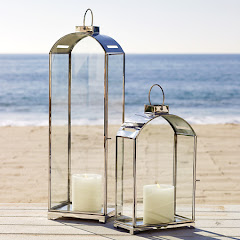
Um dos motivos de decoração que mais amo é sem dúvida o mar...
E mar combina com vela? Com certeza! Na areia essas lanternas protegem contra o vento e o efeito é lindo!

E dentro de casa, amei esse efeito das velas na areia...
o mar acalma, o mar embala, o mar lava a alma!























.jpg)







4 comentários:
Oi querida obrigado pela força..tem selo para vc lá no blog
Beijão
Olavo
Selo merecido, Mírian!
bjs!
Oi Dé,
Depois, dá uma chegada no blog da Mamy,
passamos muiiiiito tempo saboreando aquele espaço encantado, feito com tanto amor!
Nos emocionamos fortemente. Fiquei mais emocionanda ainda com a emoção dela. Ela ficou subitamente sem palavras, ficamos longo tempo esperando vir as palavras... cuidei para colocar cada uma das palavras ditadas por ela. Pena que não me lembrei de entrar no blog dela com as senha que vc me deu, para ser postado com o perfil dela. Esqueci... mas das próximas vezes farei isso.
Ela ficou extremamente emocionada, deu uma fraqueza nela e teve que ir dormir um pouco. Mas foi feliz da vida... hehe!
Vc não é fraca não, minha irmã! Está para nascer alguém que seja capaz de despertar em nós emoções tão fortes quanto vc!
Quem ler isso pode até achar que estou exagerando, mas só quem te conhece bem, sabe do que vc é capaz!
beijos, muitos beijos e abraços de saudades e muita gratidão!!!
Netbook Buying Guide
By Andrew Moore-Crispin, Digital Trends
Netbooks are a relative newcomer to the world of portable computers. They sit comfortably at the opposite end of the spectrum from the "desktop replacement" notebooks, those laptops with big screens, beefy specs and full-sized keyboards.
More from DigitalTrends.com
Netbooks sacrifice optical drives (CD/DVD drives) and have generally modest hardware specifications, smaller screen sizes and shrunken keyboards. They also tend toward smaller hard drive sizes ... oftentimes much, much smaller. What you get in return is a small PC that is truly ultra-portable, weighing less than two pounds in some cases. In other words, a netbook is an ideal travel companion.
Is a netbook right for you?
This is the first question you have to ask yourself, and it's a big one. If you already have a desktop PC or a desktop replacement notebook at home or in the office, and you want something small and light to take to the coffee shop or to use while sitting on the couch, the answer is an emphatic "yes." On the other hand, if you're looking for a primary machine, you may want to step up to a full notebook with a bigger screen, full-size keyboard, an optical drive, more hard drive space, and so on, at a sacrifice to portability.
Acer Aspire One
Windows or Linux?
In keeping the price down — in some cases, at or below the $300 mark — netbooks don't just make sacrifices to the hardware specs. Often, they use an open-source operating system in lieu of the more familiar Windows environment. While netbooks that run a version of Linux don't generally require you to be a Linux guru to use them (though to get the most out of a Linux netbook it can't hurt), it's a bit of a departure from the familiar for Windows or Mac users.
That said, many netbooks like Acer's excellent Aspire One line do offer Windows XP versions. Microsoft's operating system is decidedly not free, so this option adds to the price — generally about $50 or so.
True netbooks — that is, those costing less than $500 — aren't up to the task of running Windows Vista.
HP 2133 Mini-Note
Netbook or "Ultra Portable?"
There are other tiny PCs that keep the size and weight down, but not the sticker price. These are considered "ultra-portable" PCs and they're a very different category. While you still get the smaller keyboard and screen and, as a result, a much smaller and more portable laptop, ultra portable PCs tend to run the latest operating system. To run said operating system, the specs (processor speed, amount of memory, hard drive size and more) climb, and with them, the price. HP's 2133 Mini-Note PC is a good example of the ultra-portable category: It runs Windows Vista, has a 120GB hard drive, 2GB of memory but suffers with an underpowered Via processor. So configured, it costs more than $800, a far cry from the sub-$500 price tag of a netbook.
The Key Question
Netbooks have smaller-than-standard keyboards. Some use chiclet-style or smaller-sized keys, and can be a difficult adjustment for people used to typing on a full laptop keyboard. It becomes that much more difficult if you have big hands. Some make the sacrifice work nicely, and while you probably won't want to write your full manifesto or the great American novel on the keyboard, they're ideal for general text entry or writing, or writing up to a couple thousand words at a go. The only way to tell if the keyboard will work for you is to try it out. Get down to your local electronics store and get hands-on.
Navigation Niggles
In addition to smaller keyboards, netbooks also have smaller navigation track pads than full-sized laptops. Sometimes the left- and right-click buttons are one rocker switch style bar, and sometimes they're placed on either side of the track pad. This can take some getting used to. Test drive the navigation with an in-store demo model to find out if you can see yourself making the adjustment.
ASUS Eee 700
The Display Directive
With their small chassis and keyboards, netbooks also have diminutive displays. The de facto standard is 8.9 inches. This small screen is fine for just about anything you'd want your computer to do, but makes multi-tasking, like reading from a document while bashing out a response email, difficult. It could be much worse, though: The original ASUS Eee 700 PC that kick-started the netbook category had a tiny 7-inch screen that was exceedingly difficult to work with.
Color Me Stylish
Netbooks are perfect for an afternoon in your local Wi-Fi equipped coffee shop. However, as all the designer-PC-sporting hipsters in said coffee shop demonstrate, it's as much about looking good (and busy) as it is actually getting stuff done. To that end, netbooks are available in an array of colors. From standard black and white to silver, pink, blue and so on. Which color is right for you?
System Specs
We mentioned that netbooks make sacrifices to the system specs to keep the size and price tag down. The question becomes how low should you go? Consider this a minimum list of product specs when shopping for a netbook:
Processor: 1.4 GHz Intel Atom or better. Steer clear of anything with a lower clock speed, and of marginal processors like the older Via chips found in HP's Mini-Note PCs.
Memory: 1GB or better. Whether running Windows XP or a version of Linux, 1GB of memory is the number to look for. With 512MB of RAM you'll have a functional netbook, and might be able to enter the market at the elusive $300 price point, but the extra $50 or so that 1GB of RAM adds to the price is money well spent.
Storage: Depends on your needs. If you want to keep your entire music collection on your netbook, if you want to keep a library of movies or have other storage needs, the 8GB solid-state drives (SSD, read: no moving parts) won't do. Look for a 120GB standard (read: lots of moving parts) hard drive. This writer prefers the stability and access speed of SSD drives, but the small capacity means you'll have to make sacrifices.
Battery: 6-cell. The whole point of getting a netbook is to have an ultra portable machine you can take with you anywhere and everywhere. There's not much point though if your battery dies after a couple of hours with the wireless antenna turned on, as with a netbooks that sport 3-cell batteries. Opt for the 6-cell, and live with the price increase (about $50) or you won't get far from the nearest power outlet.
Is a netbook a wise investment?
If portability comes at a premium, then yes. If you're going to be desk-bound for a majority of your working time, then a more powerful and still portable PC would be a wiser investment.
However, for light-duty use like surfing the Internet, typing out emails, creating documents and generally keeping on top of all that's happening online, netbooks are an excellent halfway point between a full PC and a BlackBerry or iPhone. They pack light, and so are perfect as go-anywhere computers.
For what it's worth, this writer's netbook travels literally everywhere with him. It's so small and light that I don't even have to debate whether or not to bring it along. If I have my backpack (which I almost always do), it's a given that I have my netbook close at hand.
Postar um comentário